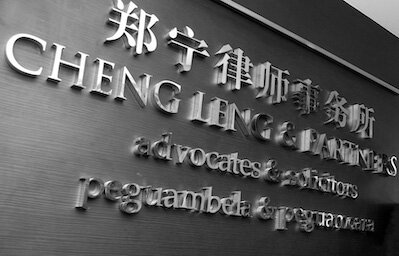Best Renewable & Alternative Energy Lawyers in Seremban
Share your needs with us, get contacted by law firms.
Free. Takes 2 min.
List of the best lawyers in Seremban, Malaysia
About Renewable & Alternative Energy Law in Seremban, Malaysia
Renewable and alternative energy is becoming an increasingly important sector in Seremban, Malaysia. Driven by the need for sustainable energy sources and the government's commitment to lower carbon emissions, Seremban has seen a rise in solar, hydro, and biomass energy projects. The laws and regulations governing renewable and alternative energy in Malaysia cover everything from installation and operation to safety and environmental impact. In Seremban, these laws are enforced locally with guidance from national policy, creating an environment where both individuals and businesses can participate in the energy transition while complying with legal requirements.
Why You May Need a Lawyer
Engaging in renewable and alternative energy projects often involves complex legal considerations. You may need a lawyer in the following situations:
- Applying for permits and licenses for solar panels, wind turbines, or other installations
- Navigating environmental regulations and compliance issues
- Drafting or reviewing contracts with suppliers, installers, or energy buyers
- Resolving disputes related to land use, property boundaries, or rights-of-way
- Sourcing government incentives, subsidies, or grants for renewable energy projects
- Addressing intellectual property matters related to energy technology
- Managing community concerns or opposition to alternative energy installations
- Ensuring compliance with safety standards and technical regulations
A knowledgeable lawyer can help safeguard your interests, ensure compliance with all relevant laws, and streamline the process of participating in the rapidly evolving renewable energy sector.
Local Laws Overview
Seremban, as part of Negeri Sembilan, adheres to Malaysia’s national renewable energy framework but also implements local regulations. Key aspects include:
- Renewable Energy Act 2011 - Governs the production, supply, and use of renewable energy. It outlines the licensing process and feed-in tariff mechanisms.
- Electricity Supply Act 1990 - Regulates the supply of electricity, including that generated from renewable sources, and covers safety requirements.
- Fit-in Tariff (FiT) System - Allows individuals and businesses to sell renewable energy back to the grid at government-guaranteed rates, subject to approval from the Sustainable Energy Development Authority (SEDA).
- Environmental Quality Act 1974 - Addresses the environmental assessments required for energy projects to minimize adverse impacts on the environment.
- Local Council Regulations - Sets specific rules regarding planning permission, building codes, and zoning for renewable energy installations in Seremban.
Compliance with these laws is necessary for project approval, continued operation, and accessing incentives available in Malaysia.
Frequently Asked Questions
What renewable energy sources are most common in Seremban?
Solar energy is the most prevalent, with increasing interest in biomass and small-scale hydro efforts led by initiatives from both the public and private sectors.
Do I need a permit to install solar panels on my property?
Yes, property owners must typically obtain approval from the local council and comply with national safety standards before installing solar panels.
Are there incentives for renewable energy investment in Seremban?
Yes, under the Feed-in Tariff (FiT) programme, qualified producers can sell electricity back to the grid at attractive rates. Other incentives might include grants or tax reliefs.
Can I sell electricity produced from my solar panels to the national grid?
Yes, subject to registration and approval by SEDA Malaysia under the Feed-in Tariff mechanism.
What happens if my project does not comply with environmental regulations?
Non-compliance can result in penalties, revocation of permits, or enforced shutdown of the project.
Are there specific building codes for renewable energy installations?
Yes, Seremban’s local council may impose specific requirements regarding installation, safety, site design, and aesthetics for energy installations.
How do I address disputes with neighbors about an energy project?
These disputes may involve zoning or nuisance claims and are best addressed through negotiation, mediation, or legal proceedings with the help of a lawyer.
What role does SEDA Malaysia play?
SEDA Malaysia oversees the licensing and regulation of renewable energy projects and administers the Feed-in Tariff system.
Do businesses face different regulations than individuals?
Yes, commercial projects often require more comprehensive environmental assessments, permits, and may be subject to stricter safety and operational regulations.
Can foreign investors participate in Seremban’s renewable energy sector?
Foreign investors are welcome but may face additional investment requirements or need to partner with local entities in compliance with Malaysian investment laws.
Additional Resources
- Sustainable Energy Development Authority (SEDA) Malaysia - Government body overseeing renewable energy policies
- Ministry of Energy and Natural Resources - Responsible for national energy strategies
- Negeri Sembilan Department of Environment - Manages environmental compliance and permits
- Seremban Municipal Council - Local regulatory authority for permits and planning approval
- Malaysian Green Technology and Climate Change Centre (MGTC) - Provides information on green technology adoption and incentives
- Malaysian Photovoltaic Industry Association (MPIA) - Industry advocacy group for solar and photovoltaic sectors
Next Steps
If you are considering a renewable or alternative energy project in Seremban, Malaysia, the best course of action is to consult with a qualified lawyer who specializes in this area. Begin by:
- Identifying your specific project or legal concern
- Gathering any relevant documents such as permits, contracts, and communications with authorities
- Contacting the relevant governmental body or regulatory authority for guidance on required approvals
- Scheduling a consultation with a legal professional familiar with renewable energy law and local Seremban regulations
- Staying updated on changes in local and national policies that may affect your project
A lawyer can help clarify legal requirements, represent your interests in negotiations or disputes, and ensure your project proceeds smoothly from start to finish.
Lawzana helps you find the best lawyers and law firms in Seremban through a curated and pre-screened list of qualified legal professionals. Our platform offers rankings and detailed profiles of attorneys and law firms, allowing you to compare based on practice areas, including Renewable & Alternative Energy, experience, and client feedback.
Each profile includes a description of the firm's areas of practice, client reviews, team members and partners, year of establishment, spoken languages, office locations, contact information, social media presence, and any published articles or resources. Most firms on our platform speak English and are experienced in both local and international legal matters.
Get a quote from top-rated law firms in Seremban, Malaysia — quickly, securely, and without unnecessary hassle.
Disclaimer:
The information provided on this page is for general informational purposes only and does not constitute legal advice. While we strive to ensure the accuracy and relevance of the content, legal information may change over time, and interpretations of the law can vary. You should always consult with a qualified legal professional for advice specific to your situation.
We disclaim all liability for actions taken or not taken based on the content of this page. If you believe any information is incorrect or outdated, please contact us, and we will review and update it where appropriate.












